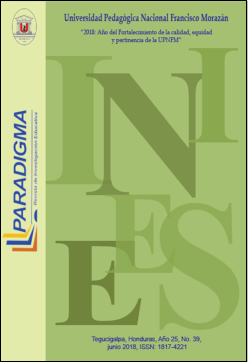Una propuesta curricular para la educación intercultural en Honduras: evaluación y resultados
DOI:
https://doi.org/10.5377/paradigma.v25i39.6256Palabras clave:
tradición oral, libro álbum, educación intercultural bilingüe, formación docente en EIBResumen
En este artículo se argumenta cómo la literatura de tradición oral, presentada en el formato de libro álbum, puede aprovecharse como un recurso didáctico de gran efectividad en programas de educación intercultural bilingüe, gracias a la identificación de elementos intertextuales entre las narraciones de los pueblos en contacto, y cuya funcionalidad educativa se potencia siguiendo las recomendaciones del enfoque comunicativo, la educación literaria, la literatura comparada, la estética de la recepción y la neurociencia. Para comprobarlo, se evaluó una propuesta curricular diseñada en dichos términos, en centros educativos de la región Norte de Honduras, donde coexisten tres culturas: mestiza, garífuna y miskita. La investigación fue de tipo cualitativa con un diseño de tipo fenomenológico, abierto y emergente. Como resultado principal, se logró una amplia aceptación de esta propuesta por parte de la comunidad educativa, implicando con ello una nueva valoración de la literatura de tradicional oral y de la metodología para enseñar interculturalidad.
Descargas
1338
Descargas
Publicado
Cómo citar
Número
Sección
Licencia
Cesión de Derechos de Autor
- El autor o autora, al enviar el trabajo, manifiesta que es su voluntad ceder a la Universidad Pedagógica Nacional Francisco Morazán los derechos patrimoniales que le corresponden como autor de su trabajo.
- Los derechos aquí cedidos comprenden todos los derechos patrimoniales (Reproducción, transformación, comunicación pública y distribución) y se dan sin limitación alguna en cuanto a territorio se refiere; esta Cesión se da por todo el término de duración establecido en la legislación vigente en Honduras.
- La cesión de los derechos antes mencionada no implica la cesión de los derechos morales sobre la misma, porque de conformidad con lo establecido en la Ley de Derechos de Autor y Derechos Conexos, Capítulo II, de los Derechos Morales, Artículo 34, Artículo 25, estos derechos son irrenunciables, imprescriptibles, inembargables e inalienables.
- El trabajo de investigación o documento debe ser original y haber sido realizado sin violar o usurpar derechos de terceros, por lo tanto, la obra es de autoría exclusiva y posee la titularidad de la misma.
- En caso de presentarse cualquier reclamación o acción por parte de un tercero, en cuanto a los derechos de autor sobre la obra en cuestión, el autor deberá asumir toda la responsabilidad sobre los derechos cedidos.
- Al completar el Formato de Cesión de Derechos el autor manifiesta que el trabajo no ha sido publicado en otro medio, que los derechos sobre el trabajo no han sido cedidos y que sobre ellos no pesa ningún gravamen ni limitación en su uso o utilización.





